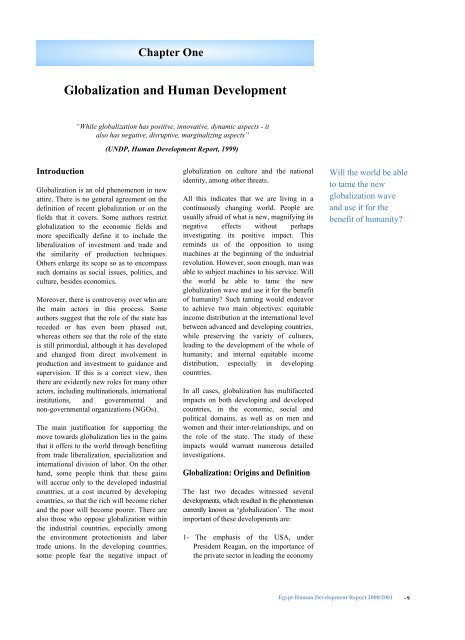English - Human Development Reports - United Nations ...
English - Human Development Reports - United Nations ...
English - Human Development Reports - United Nations ...
Create successful ePaper yourself
Turn your PDF publications into a flip-book with our unique Google optimized e-Paper software.
Chapter OneGlobalization and <strong>Human</strong> <strong>Development</strong>“While globalization has positive, innovative, dynamic aspects - italso has negative, disruptive, marginalizing aspects”(UNDP, <strong>Human</strong> <strong>Development</strong> Report, 1999)IntroductionGlobalization is an old phenomenon in newattire. There is no general agreement on thedefinition of recent globalization or on thefields that it covers. Some authors restrictglobalization to the economic fields andmore specifically define it to include theliberalization of investment and trade andthe similarity of production techniques.Others enlarge its scope so as to encompasssuch domains as social issues, politics, andculture, besides economics.Moreover, there is controversy over who arethe main actors in this process. Someauthors suggest that the role of the state hasreceded or has even been phased out,whereas others see that the role of the stateis still primordial, although it has developedand changed from direct involvement inproduction and investment to guidance andsupervision. If this is a correct view, thenthere are evidently new roles for many otheractors, including multinationals, internationalinstitutions, and governmental andnon-governmental organizations (NGOs).The main justification for supporting themove towards globalization lies in the gainsthat it offers to the world through benefitingfrom trade liberalization, specialization andinternational division of labor. On the otherhand, some people think that these gainswill accrue only to the developed industrialcountries, at a cost incurred by developingcountries, so that the rich will become richerand the poor will become poorer. There arealso those who oppose globalization withinthe industrial countries, especially amongthe environment protectionists and labortrade unions. In the developing countries,some people fear the negative impact ofglobalization on culture and the nationalidentity, among other threats.All this indicates that we are living in acontinuously changing world. People areusually afraid of what is new, magnifying itsnegative effects without perhapsinvestigating its positive impact. Thisreminds us of the opposition to usingmachines at the beginning of the industrialrevolution. However, soon enough, man wasable to subject machines to his service. Willthe world be able to tame the newglobalization wave and use it for the benefitof humanity? Such taming would endeavorto achieve two main objectives: equitableincome distribution at the international levelbetween advanced and developing countries,while preserving the variety of cultures,leading to the development of the whole ofhumanity; and internal equitable incomedistribution, especially in developingcountries.In all cases, globalization has multifacetedimpacts on both developing and developedcountries, in the economic, social andpolitical domains, as well as on men andwomen and their inter-relationships, and onthe role of the state. The study of theseimpacts would warrant numerous detailedinvestigations.Globalization: Origins and DefinitionThe last two decades witnessed severaldevelopments, which resulted in the phenomenoncurrently known as ‘globalization’. The mostimportant of these developments are:1- The emphasis of the USA, underPresident Reagan, on the importance ofthe private sector in leading the economyWill the world be ableto tame the newglobalization waveand use it for thebenefit of humanity?Egypt <strong>Human</strong> <strong>Development</strong> Report 2000/2001 - 9
















